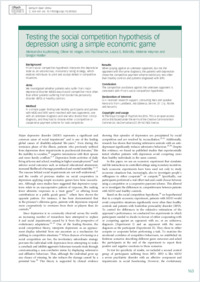Testing the social competition hypothesis of depression using a simple economic game
DOKPE
- Kupferberg, Aleksandra University of Bern, Switzerland
- Hager, Oliver M. University of Zurich, Switzerland
- Fischbacher, Urs Thurgau Institute of Economics, Kreuzlingen, Switzerland
- Brändle, Laura S. University of Bern, Switzerland
- Haynes, Melanie University of Bern, Switzerland
- Hasler, Gregor ORCID [University of Fribourg] ; University of Bern, Switzerland
- 2016
Published in:
- BJPsych Open. - Cambridge University Press / Royal College of Psychiatrists. - 2016, vol. 2, no. 2, p. 163 - 169
major depressive disorder
MDD
borderline personality disorder
BPD
task completion
Price's social competition hypothesis
English
Background: Price's social competition hypothesis interprets the depressive state as an unconscious, involuntary losing strategy, which enables individuals to yield and accept defeat in competitive situations.
Aims: We investigated whether patients who suffer from major depressive disorder (MDD) would avoid competition more often than either patients suffering from borderline personality disorder (BPD) or healthy controls.
Method: In a simple paper-folding task healthy participants and patiens with MDD and BPD were matched with two opponents, one with an unknown diagnosis and one who shared their clinical diagnosis, and they had to choose either a competitive or cooperative payment scheme for task completion.
Results: When playing against an unknown opponent, but not the opponent with the same diagnosis, the patients with depression chose the competitive payment scheme statistically less often than healthy controls and patients diagnosed with BPD.
Conclusion: The competition avoidance against the unknown opponent is consistent with Price's social competition hypothesis.
Aims: We investigated whether patients who suffer from major depressive disorder (MDD) would avoid competition more often than either patients suffering from borderline personality disorder (BPD) or healthy controls.
Method: In a simple paper-folding task healthy participants and patiens with MDD and BPD were matched with two opponents, one with an unknown diagnosis and one who shared their clinical diagnosis, and they had to choose either a competitive or cooperative payment scheme for task completion.
Results: When playing against an unknown opponent, but not the opponent with the same diagnosis, the patients with depression chose the competitive payment scheme statistically less often than healthy controls and patients diagnosed with BPD.
Conclusion: The competition avoidance against the unknown opponent is consistent with Price's social competition hypothesis.
- Faculty
- Faculté des sciences et de médecine
- Department
- Master en médecine
- Language
-
- English
- Classification
- Pathology, clinical medicine
- License
- Open access status
- gold
- Identifiers
-
- DOI 10.1192/bjpo.bp.115.001362
- ISSN 2056-4724
- Persistent URL
- https://folia.unifr.ch/unifr/documents/327597
Statistics
Document views: 84
File downloads:
- kupferbergetal.2016: 105
